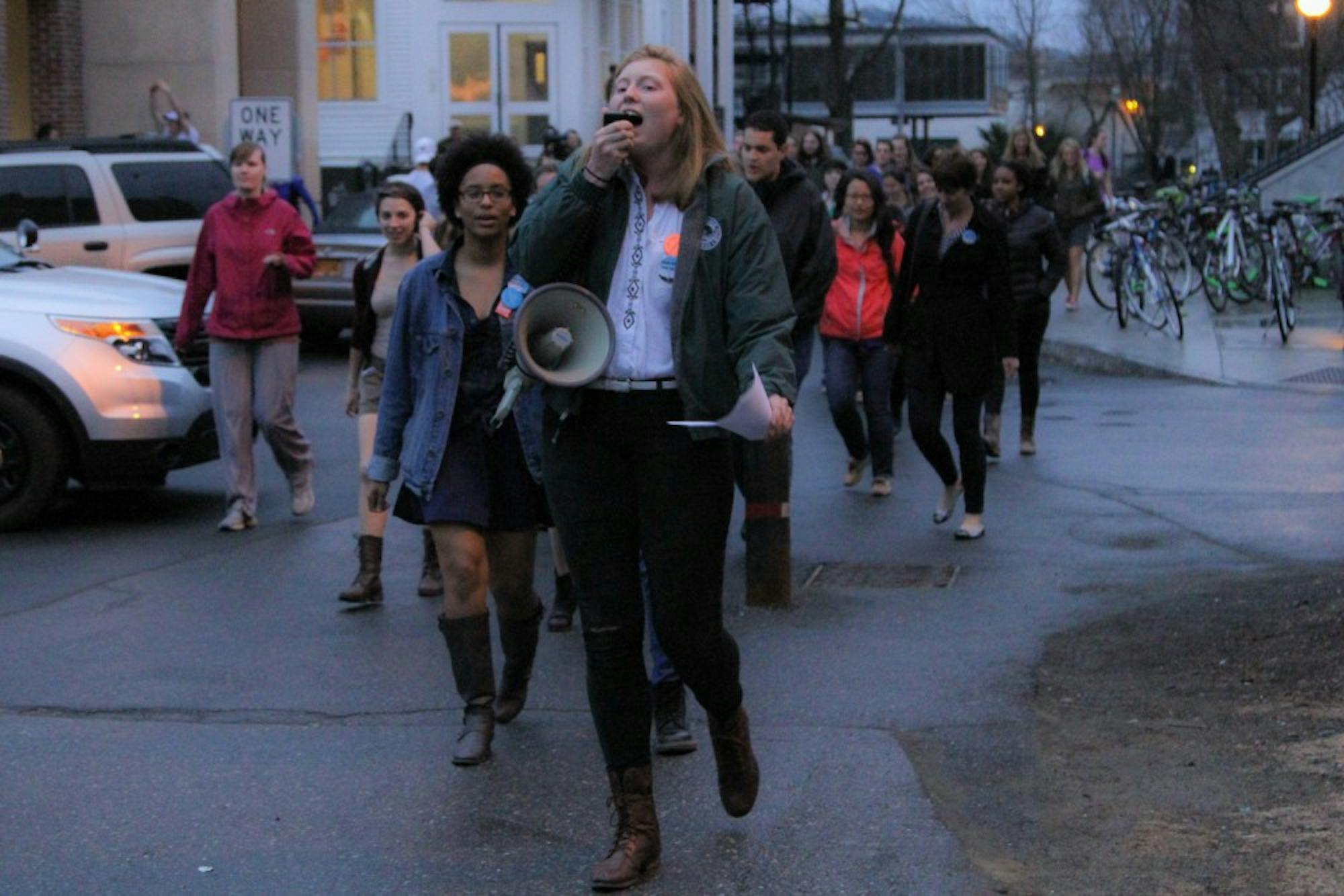About 40 students and community members marched under a dreary, wet sky on Tuesday evening to protest sexual assault as a part of the annual Take Back the Night rally. The march followed a larger gathering, at which speakers discussed the damage that sexual assault causes and ways they hope to combat it.
“Stop the violence, stop the hate,” marchers chanted as they wound their way from the Collis Center to the Rockefeller Center and around the Green.
“Wherever we go, however we dress: no means no, and yes means yes.”
Take Back the Night rallies, which have occurred at Dartmouth since 1991, demand a campus where people feel safe from sexual assault.
As part of sexual assault awareness month, the rally began in Collis Common Ground in front of a crowd of around 90, with four primary speakers. The crowd comprised students, community members and faculty, and consisted of mostly women.
Community members must speak out to support victims, and reporting sexual assault can be difficult, said Kate Rohdenburg, program director of WISE, a domestic and sexual violence support center in Lebanon.
Assistant men’s swimming and diving coach Jenn Verser discussed her experience as a sexual assault survivor and the trauma it caused her, describing the shock, confusion and anger that she, her family and her friends endured. She was so surprised after the incident that she did not allow herself to acknowledge it until a week later, she said.
Verser said that sexual assault affects everyone and that no one deserves to live in fear, a sentiment echoed throughout the night.
The next speaker, Gabby Bozarth ’17, called on individuals to act against sexual assault, noting that eliminating it will require a significant amount of work. Action, she said, must address the problem’s source — the assailants — by making them uncomfortable about assault.
The final speaker, health promotion and wellness office manager Carissa Dowd, spoke about her personal experience with sexual assault and the roadblocks the Vermont justice system creates for victims. After being threatened with a tire iron and sexually assaulted in front of her children, her life seemed to be split in two, Dowd said.
She said that although she immediately called the police, who arrested the perpetrator within the hour, she struggled to press her case. The prosecutor appeared apathetic at best toward her case, she said, but she still worked to ensure that her attacker would be convicted and imprisoned.
After their loop, the marchers returned to Collis, gathered in a circle and shared personal responses.
Many marchers expressed frustration with a perceived lack of support from campus organizations, but said they were thankful to those who came.
Throughout the rally, speakers emphasized that rape jokes create an environment in which sexual assault is not treated seriously.
“I hope people have the confidence, that I feel like this event instills in people, and they have the confidence enough to tell people when they are being wrong, when they make jokes that are offensive and dangerous and when their behaviors are in line with rape culture,” Alice Morrison ’14, who introduced the rally, said in an interview.
Sexual assault awareness program coordinator Rebekah Carrow said she was pleased with the number of students who attended despite the inclement weather.
“We had a great energy in the room as people sort of processed survivor stories, and I hope in the future that folks will continue to take that energy forward as we continue to tackle these problems,” she said.
Carrow noted that the event had ties to past protests and rallies at colleges throughout the country. A Dartmouth Dining Services employee mentioned that she had not seen signs like those at the rally since she was in college, Carrow said.
Take Back the Night is a charitable foundation aimed at combating sexual violence. Similar events have been held internationally and at thousands of locations throughout the country since the 1970s, according to the organization’s website.




